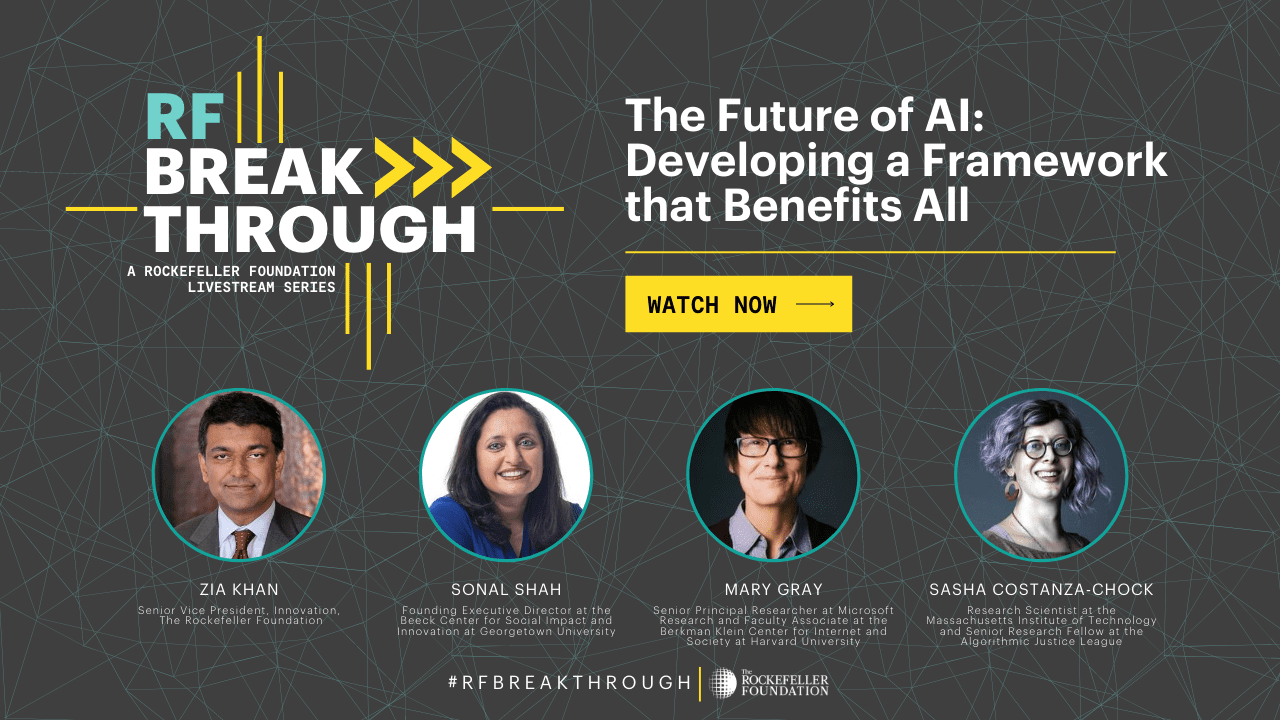At The Rockefeller Foundation, we’ve always tried to stay one step ahead – imagining futures that inspire bold action and making catalytic bets that can lead to long-term change. As an institution deeply rooted in science and technology, we understand their transformational power to address today’s challenges – and help plan for those we haven’t yet envisioned.
In the 1930s, Warren Weaver, who led The Rockefeller Foundation’s programs in natural sciences, had a hunch that chemical and physical explanations of life would lead to a whole new world of research and discovery. He coined the term “molecular biology” and a field was born.
In 1956, The Rockefeller Foundation supported the Dartmouth Summer Research Project on Artificial Intelligence, which was the first use of “artificial intelligence” as well. After some fits and starts, that field exploded too.
And now, artificial intelligence has combined with molecular biology to accelerate the development of vaccines and therapeutics for the world’s worst pandemic since 1918.
Could any of this have been predicted? Absolutely not. However, both molecular biology and artificial intelligence were guided by visions of positive futures where both fields contributed to improving people’s well-being.
Unfortunately, we must also plan for futures that aren’t as bright – be it due to a disease outbreak or natural disaster – to minimize harm and prepare for recovery.
In 2009, The Rockefeller Foundation conducted an exercise to explore the future of technology in development and identify ways to better respond to emerging challenges. The results were captured in a report that includes several plausible scenarios that could impact millions of people around the world. One such scenario, “Lockstep,” described a fictional pandemic that would infect 20% of the world in 2012, killing eight million people in just seven months.
Now that we’re well into a real pandemic, we see some chilling similarities between our current Zoom-centered world and Lockstep. The report predicted that telepresence technologies would “respond to the demand for less-expensive, lower bandwidth, sophisticated communications systems for populations whose travel is restricted.” Other predictions were off, including the emergence of MRI technologies to detect abnormal behavior with anti-social intent.
While baseless posts have circulated recently calling the exercise part of a “diabolical plan for world domination,” we see it as further evidence of the importance of scenario planning in helping governments, institutions and others navigate near-term decisions that can have long-term impact. Our hope then – as it is now – was to focus on what we don’t know so we could make better plans to address a real pandemic, such as the one we’re facing today.
There are many reasons to worry that things will get worse. But there’s also reason to believe that leaders have a window to propose bold solutions that can reset our social, economic, and environmental systems to a much better ‘new normal.’
That’s why The Rockefeller Foundation is again making big bets on the future to ensure a more equitable return to ‘normal’ for all. As we’ve done several times over the past 100+ years, we’re pushing the boundaries of what’s possible to address some of the greatest challenges of our time.
One way we’re doing that is by reimagining how we grow, access and consume food. Through our Food System Vision Prize we’re developing a vision for a regenerative and nourishing food system that can deliver sustainable, healthy diets for people and the planet by 2050.
To get there – or any reimagined future for that matter – we’re taking bold steps to bridge the gap between today and our vision for tomorrow. We’re exploring how disruptive technologies – like artificial intelligence – can help reset the future, while leveraging our network of experts through our 17 Rooms partnership with The Brookings Institution to catalyze paradigm shifts for a “Great Reset” that help accelerate progress towards the Sustainable Development Goals and beyond.
Innovation, research, convening and partnerships are integral to everything that we do at The Rockefeller Foundation, and it’s helped us continuously look beyond the horizon to imagine a bold new future for all. Now is the time to work our way towards it.
Recent Updates

The Future of AI: Developing a Framework that Benefits All
Tune into #RFBreakthrough, a don’t-miss live stream series highlighting urgent and innovative discussions with thought leaders and industry experts. For the second episode in the #RFBreakthrough series, The Rockefeller Foundation hosted a live stream discussion on how we can use artificial intelligence as a force for good during the pandemic and beyond, while also exploring […]
More